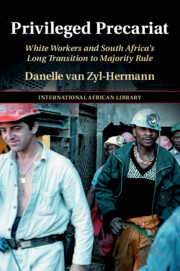‘An important contribution to both historical and social science scholarship on South Africa, this account of white labour politics, with particular emphasis on Afrikaners [traces the trajectory of white trade unions from the militantly anti-capitalist but racially exclusivist battles of the early 20th Century, through an ambiguously privileged situation under apartheid, to recent attempts to adjust to majority rule. The book shows that white society was never fully unitary, but always reflected class divisions. This outstanding work combines innovative archival scholarship with the author's remarkable field-work study on the Solidarity movement of recent years.’
Jonathan Hyslop - Colgate University and University of Pretoria
‘Meticulously-researched and rigorously analytical, this is an extremely rich, perceptive and sensitive study of a neglected strand in the history of modern South African society - white workers. Vivid and instructive, as a clear-eyed exploration of how white labour dealt with its ambiguity in a country riven by race and class, there really is nothing quite like it in the field. This story of mixed human fortunes is summed up perfectly by its deliciously snappy title’.
Bill Nasson - University of Stellenbosch
‘An insightful and original historical analysis of the multi-layered politics and subjectivities of white workers from the early 20th century into the democratic era. Its examination of the MWU’s evolution from a racially-exclusive union to its reinvention as Solidarity persuasively asserts that the late 1970s was the crucial moment of crisis for white workers’ relationship with the apartheid state. Importantly, the book lays bare Solidarity’s contemporary project, inspired by the Zionist Histadrut, to create a ‘state-in-state’ particularly in the interests of white Afrikaans-speakers.’
Noor Nieftagodien - University of the Witwatersrand
‘Working intersections between race and class, past and present, and archival research and remarkable oral interviews, Privileged Precariat helps to mark the emergence of southern Africa as a leading site for the study of whiteness. An elegantly written and closely argued demonstration of the role of the state in racial formation.’
David Roediger - University of Kansas
‘Van Zyl-Hermann fills a major gap in the literature … She draws compelling parallels with the economic fate of white American workers and the rise of Donald Trump, underlining the contemporary salience of this well-written, well-sourced book …’
Peter Limb
Source: The Journal of Interdisciplinary History



